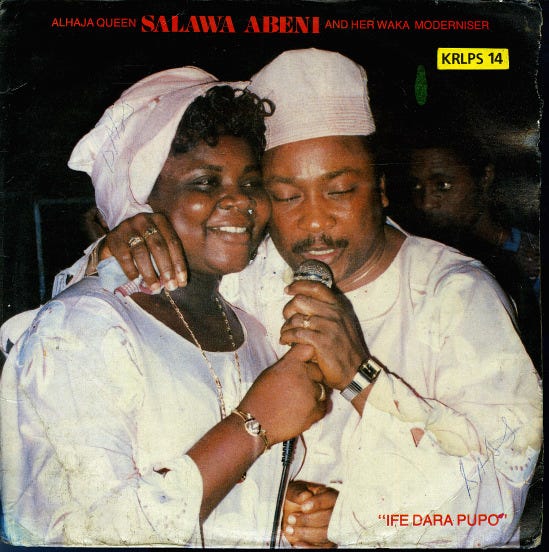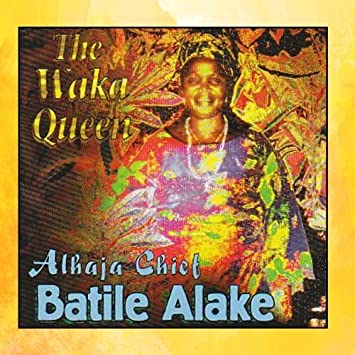Salawa Abeni Alidu (born 5 May 1961) is a Nigerian singer. An Ijebu Yoruba from Ijebu Waterside, in Ogun State, she began her professional career in waka music when she released her debut album titled, Late General Murtala Ramat Mohammed, in 1976, on Leader Records. It became the first recording by a female artist in Yoruba Songs to sell over a million copies in Nigeria.
Abeni continued recording for Leader until 1986, when she ended a relationship with the record label’s owner, Lateef Adepoju. She married Kollington Ayinla and joined his record label instead, staying with him until 1994.

She was crowned “Queen of Waka Music” by the Alaafin of Oyo, Oba Lamidi Adeyemi in 1992.
Waka is an Islamic-influenced, traditional Yoruba music style, popularized by Batile Alake; it is a much older genre than jùjú and fuji. When you talk of Waka music, one name that readily comes to mind is Queen Salawa Abeni.
Although the music was popularised by Batile Alake years back before Queen Salawa came on the scene.

For those who don’t know, lets quickly tell you that Waka is an Islamic influenced traditional Yoruba music style which is a much older genre than Juju and Fuji. Queen Salawa Abeni came and redefined Waka.
Queen Salawa Abeni Alidu, the undisputed Queen of Waka music in Nigeria. An Ijebu woman from Ijebu waterside in Ogun state, she has been at it for 44 years, since 1974.
She was then aged 15, an age when many young people her age were still under the care of their parents. She began her professional career in Waka music when she released her debut titled Late Gen. Murtala Ramat Mohammed, in 1976, on Leader Records.
It became the first recording by a female artist in Yoruba music genre to sell over a million copies in Nigeria.
So good is Salawa that she was crowned the Queen of Waka Music by the Alaafin Of Oyo, Oba Lamidi Adeyemi in 1992.

Born in Igbogun, one of the mangrove villages that borders Ogun and Lagos Sate, young Salawa Abeni‘s life started out hard: as one of the several children in a polygamous family, hers took a sad turn that her other siblings – her mother was sickly and she was sent off to work as a housemaid in the closest big town to her village, Epe.
Although her father did not particularly care about education, the ‘guardian’ saw to it that she at least got the basic primary education.
But she had a gift that was spotted early by her minders: her melodious voice was perfect for ‘Waka’, the indigenous traditional Yoruba music sung mostly by women.
The genre had become widely popular in the proceeding decades, pioneered by Alhaja Batile Alake. As matter of fact, Batile Alake was one of the musicians that entertained Queen Elizabeth II during her visit to Nigeria in 1956.
In the ’60s and ’70s however, Waka was slightly overshadowed by the newer Fuji and Juju sounds. King Sunny Ade, Ebenezer Obey, Sikiru Ayinde Barrister and so many others had broken out and were becoming stars while Waka was relegated to women’s gatherings and such like.
Salawa knew she wanted to be like the stars she heard on radio but her childlike mind could not even fathom how that was going to happen. Nobody could have: she was a barely educated child, far from the city centre where things could happen.
But she found happiness whenever she could sing, either she was playing with her mates or attending the ‘asalatu’ prayers at the local mosque. Soon she began singing at parties and social gatherings of the mosque women.
Around 1974, she was spotted by Lateef Adepoju, a businessman with interest in music. He was attracted to the raw talent in the young girl performing so freely and prodigiously at an event in Lagos.
After months of negotiation with her parents who felt (rightly so) that their daughter was too young to be exposed to the uneasy world of music entertainment, she eventually was signed to Adepoju’s Leader Records.
Her very first album on the label was her 1976 record, Late Murtala Muhammed, dedicated to the recently assassinated head of state. It sold over one million records, thrusting the teenager into instant stardom.
In later years, she disclosed that she saw very little of the proceeds of that record, along with 14 others she released under that label. But while her relationship with Lateef Adepoju and Leader Records lasted, she shone brightly despite competing with established male megastars that were making music at the time.
